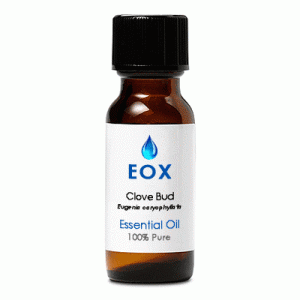|
Characteristics:
A pale yellow liquid with a sweet-spicy odor and a fruity-fresh top note. It blends well with rose,
lavender, vanilla, clary sage, bergamot, bay, allspice, and ylang-ylang.
Principal Constituents: These are naturally occuring in the essential oil.
- eugenol
- eugenol acetate
- caryophyllene
General Actions:    Open Symbols Key
Open Symbols Key
Anthelmintic, antibiotic, anti-emetic, antihistamine, antirheumatic, antineuralgic, anti-oxidant,
aphrodisiac, carminative, counter-irritant, expectorant, larvicidal, spasmolytic,
stimulant, stomachic, vermifuge.
Safety:

All clove oil can cause skin and mucous membrane irritation; clove bud oil may cause dermatitis. Use
in moderation only, in low dilution.
Primary Therapy Agent:
Toothache, teething pain.
Secondary Therapy Agent:
Acne, athlete's foot, bruises, burns, cuts/sores, insect repellent, wounds, arthritis, rheumatism,
sprains, strains, asthma, bronchitis, colic, indigestion, flatulence, nausea, vomiting, colds/flu.
Important Note: The information on Florapathics.com is
only provided for educational purposes, and further research should be done on each essential oil to be assured
of its proper usage for each individual. Aromatherapy is not meant to be a replacement for care under a qualified
health professional, but should be considered a complimentary modality.
|








